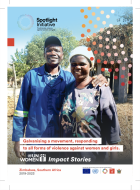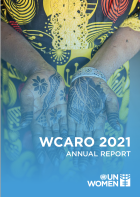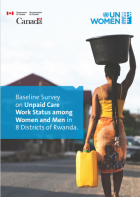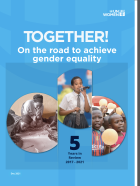1 - 13 of 13 Results
Date:
In 2022, MGCSW and UN Women South Sudan developed the Country Gender Equality Profile, highlighting progress and challenges in gender equality, women’s rights, and governance. The study calls for increased funding, legal reforms, and socio-economic initiatives to address issues like illiteracy, violence, and limited access to services. Collaborative action by the government, UN agencies, and civic groups is essential for promoting gender equality and safeguarding women’s rights. Key recommendations include allocating funding for violence survivors, establishing the Women Enterprise Fund, reviewing the Girl Child Act, and expediting gender-related laws. The government should lift social media bans, provide platforms for women’s voices, and promote women’s inclusion in constitution drafting. Efforts should also focus on disseminating the Maputo Protocol and defining the minimum marriage age to safeguard gender equality and women’s rights.
Date:
This analysis aims to gain insights into the unique challenges, needs, and priorities of women, girls, men, and boys. It seeks to guide humanitarian, development, and peace actors in tailoring their responses to effectively meet the diverse needs of returnees, refugees, displaced populations, and host communities.
Date:
This analysis aimed to assess the impact of the conflict in the Greater Pibor Administrative Area (GPAA), including key protection risks and needs, and to identify triggers of the conflict.
Date:
The ultimate goal is that women and girls in Sudan benefit from gender-responsive humanitarian action and targeted assistance that responds to their basic needs, and from opportunities for their meaningful participation in peace, political and humanitarian processes.
Date:
This brief emerges from Regional Gender Assessment of the Impact of Sudan Conflict on Women and Girls in Sudan and its Neighboring Countries. It provides the findings and recommendations of the regional gender analysis of the Sudan conflict, which UN Women conducted between July and August 2023.
Date:
Galvanizing a movement, responding to all violence and discrimination against women and girls in Zimbabwe. After four years of programming in Zimbabwe, the EU-funded Spotlight Initiative has made milestones in ending all forms of violence and discrimination against women and girls. This story booklet captures voices of the programme beneficiaries and various stakeholders in all five programme districts across Zimbabwe.
Date:
The Report documents our work with communities and stakeholders to advance Gender Equality in Zimbabwe, the challenges, interventions and results achieved
Date:
This policy brief highlights the main findings of four academic research papers on the Women, Peace and Security (WPS) agenda that were presented during a workshop organized by UN Women Ethiopia Country Office in December 2021.
The findings focus on protection of women from conflict-related sexual violence; gender-sensitive recovery programs; role of women human rights defenderds in supporting the WPS agenda; and awareness of Members of Parliament on the agenda.
Date:
2021 marked the end of the latest UN Women Strategic Plan, and during the year UN Women’s West and Central Africa Regional Office (WCARO) and Country Offices/Non-Resident Agencies continued to strengthen a comprehensive set of global norms, policies, and standards on gender equality and the empowerment of women; help end all forms of violence against women and girls; foster women’s economic empowerment; encourage and support women to lead; facilitate gender mainstreaming; and support women’s participation in peacebuilding and resilience efforts. Throughout the year, the COVID-19 pandemic continued to impact West and Central Africa, and women in the region were particularly vulnerable to the crisis.
Date:
The baseline survey on unpaid care work status among women and men in eight districts of Rwanda seeks to understand the care-related dynamics in households, this study utilized both quantitative and qualitative research methodologies. Drawing on Oxfam’s Household Care Survey (HCS) and the Harvard Analytical Framework (also referred to as the Gender Roles Framework). The survey helps to understand how women, men and children spend their time, how care activities are distributed in the household and the access that households have to basic public services and infrastructure that facilitate their everyday survival. The study also explored the social norms that shape power relations and gender division of care labor.
Date:
The five years in review publication captures the progress made from 2017 to 2021 across its different focus areas: Leadership and Political Participation, Women’s Economic Empowerment, Ending Violence Against Women, Data and Statistics, HIV/AIDS and the response to the unfolding crisis caused by the COVID-19 pandemic.
Date:
This report highlights UN Women Nigeria’s work for the year 2020. The report builds around the Nigeria Country Office programmatic areas of intervention and reflects the achievements attained in collaboration with various government and non-governmental partners who contributed to policy advocacy efforts, delivery of services, implementation, and funding of interventions aimed at promoting gender equality and women’s empowerment. The population at large (men, women, boys...
Date:
The UN Women WCARO annual report aims to share information about the regional office's activities on women empowerment and gender equality in 2020. The said year has been a particularly difficult year around the world with the COVID-19 pandemic. In West and Central Africa (WCA), women and girls were particularly vulnerable to the crisis. To counter these burdens and build medium and long- term recovery measures, the UN Women WCA Regional Office successfully provided multi-faceted assistance...













